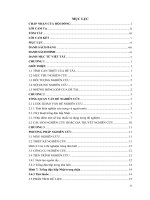Preview SAT Prep Plus 2022 5 Practice Tests + Proven Strategies + Online + Video (Kaplan Test Prep) by Kaplan Test Prep (2021)
Bạn đang xem bản rút gọn của tài liệu. Xem và tải ngay bản đầy đủ của tài liệu tại đây (563.61 KB, 18 trang )
SAT®
Prep Plus
2022
SAT® is a registered trademark of the College Board, which was not
involved in the production of, and does not endorse, this product.
Editor-in-Chief
Alexandra Strelka, MA
Contributing Editors
Brandon Deason, MD; M. Dominic Eggert; Kathryn Sollenberger, MEd; Glen
Stohr, JD
Special thanks to our faculty authors and reviewers:
Deborah Becak; Michael Cook; Christopher Cosci; Boris Dvorkin; John Evans;
Jack Hayes; Rebecca Knauer; Jo L’Abbate; Bird Marathe; Karen McCulloch;
Melissa McLaughlin; Gail Rivers; Anne Marie Salloum; Jason Selzer; Gordon
Spector; Caroline Sykes; Bob Verini, MFA; Bonnie Wang; and Ethan Weber
Additional special thanks to the following:
Laura Aitcheson; Isaac Botier; Brian Carlidge; Paula L. Fleming, MA, MBA;
Joanna Graham; Rebekah Hawthorne; Hannah Kelley; Rebecca Knauer; Abnia
Loriston, MEd; Camellia Mukherjee; Kristen Murner, PhD; Michael Wolff; Amy
Zarkos; and the countless others who made this project possible
SAT® is a registered trademark of the College Board, which was not involved in
the production of, and does not endorse, this product.
This publication is designed to provide accurate information in regard to the subject
matter covered as of its publication date, with the understanding that knowledge
and best practice constantly evolve. The publisher is not engaged in rendering
medical, legal, accounting, or other professional service. If medical or legal advice
or other expert assistance is required, the services of a competent professional
should be sought. This publication is not intended for use in clinical practice or the
delivery of medical care. To the fullest extent of the law, neither the publisher nor
the editors assume any liability for any injury and/or damage to persons or property
arising out of or related to any use of the material contained in this book.
© 2021 by Kaplan, Inc.
Published by Kaplan Publishing, a division of Kaplan, Inc.
750 Third Avenue
New York, NY 10017
All rights reserved. The text of this publication, or any part thereof, may not be
reproduced in any manner whatsoever without written permission from the
publisher.
10 9 8 7 6 5 4 3 2 1
ISBN-13: 978-1-5062-7738-7
Kaplan Publishing print books are available at special quantity discounts to use for
sales promotions, employee premiums, or educational purposes. For more
information or to purchase books, please call the Simon & Schuster Special Sales
department at 866-506-1949.
TABL
E OF
CON
TENT
S
PART 1: The SAT and You
CHAPTER 1: Inside the SAT
SAT Structure
PART 2: SAT Math
CHAPTER 2: Prerequisite Skills and Calculator Use
Math Fundamentals
Calculator Use
CHAPTER 3: The Method for SAT Math Questions
How to Do SAT Math
A Note about Grid-ins
Reflect
PART 2A: The Heart of Algebra
CHAPTER 4: Linear Equations and Graphs
How Much Do You Know?
Solving Equations
Word Problems
Linear Graphs
On Test Day
How Much Have You Learned?
Reflect
CHAPTER 5: Systems of Linear Equations
How Much Do You Know?
Substitution
Combination
Number of Possible Solutions
On Test Day
How Much Have You Learned?
Reflect
CHAPTER 6: Inequalities
How Much Do You Know?
Linear Inequalities
Systems of Inequalities
Modeling Real-Life Situations with Inequalities
On Test Day
How Much Have You Learned?
Reflect
PART 2B: Data Analysis
CHAPTER 7: Ratios, Proportions, and Percents
How Much Do You Know?
Ratios and Proportions
Unit Conversion
Percents
Percent Change
On Test Day
How Much Have You Learned?
Reflect
CHAPTER 8: Tables, Statistics, and Probability
How Much Do You Know?
Tables and Graphs
Statistics
Surveys and Data Samples
Probability
On Test Day
How Much Have You Learned?
Reflect
CHAPTER 9: Scatterplots
How Much Do You Know?
Line of Best Fit
Scatterplot Modeling
On Test Day
How Much Have You Learned?
Reflect
PART 2C: Passport to Advanced Math
CHAPTER 10: Functions
How Much Do You Know?
Function Notation
Graphs of Functions
Describing Real-Life Situations with Functions
On Test Day
How Much Have You Learned?
Reflect
CHAPTER 11: Exponents, Radicals, Polynomials, and
Rational Expressions
How Much Do You Know?
Exponents
Radicals
Polynomials
Polynomial Division
Graphs of Polynomial Functions
Modeling Growth and Decay
Rational Expressions and Equations
On Test Day
How Much Have You Learned?
Reflect
CHAPTER 12: Quadratics
How Much Do You Know?
Solving Quadratics by Factoring
Classic Quadratics
Completing the Square
The Quadratic Formula
Graphs of Quadratics
Systems of Quadratic and Linear Equations
On Test Day
How Much Have You Learned?
Reflect
PART 2D: Other Topics in Math
CHAPTER 13: Geometry
How Much Do You Know?
Similar Triangles
Pythagorean Theorem
Special Right Triangles
Circles
Arc Length and Sectors
Three-Dimensional Figures
On Test Day
How Much Have You Learned?
Reflect
CHAPTER 14: Trigonometry
How Much Do You Know?
Sine, Cosine, and Tangent
On Test Day
How Much Have You Learned?
Reflect
CHAPTER 15: Imaginary Numbers
How Much Do You Know?
Arithmetic Operations with Complex Numbers
On Test Day
How Much Have You Learned?
Reflect
CHAPTER 16: SAT Math: Timing and Section
Management Strategies
SAT Math Timing and Triage
PART 3: SAT Reading
CHAPTER 17: The Method for SAT Reading
Questions
How to Do SAT Reading
How Much Have You Learned?
Reflect
CHAPTER 18: SAT Reading Passage Strategies
How Much Do You Know?
SAT Reading Strategies—Keywords, Margin Notes,
and the Big Picture Summary
How Much Have You Learned?
Reflect
CHAPTER 19: SAT Reading Question Types
How Much Do You Know?
How to Unpack SAT Reading Question Stems
How Much Have You Learned?
Reflect
CHAPTER 20: Answering SAT Reading Questions
How Much Do You Know?
How to Answer SAT Reading Questions
How Much Have You Learned?
Reflect
CHAPTER 21: Paired Passages and Primary Source
Passages
How Much Do You Know?
How to Approach SAT Paired Passages and Primary
Sources
How Much Have You Learned?
Reflect
CHAPTER 22: Literature Passages
How Much Do You Know?
How to Read Literature for the SAT
How Much Have You Learned?
Reflect
CHAPTER 23: SAT Reading: Timing and Section
Management Strategies
Timing
Section Management
How Much Have You Learned?
PART 4: SAT Writing and Language
CHAPTER 24: The Method for SAT Writing and
Language Questions
How to Do SAT Writing and Language
CHAPTER 25: Spotting and Fixing Errors: Sentence
Structure, Punctuation, and Agreement
How Much Do You Know?
Sentence Structure: The Basics
Sentence Structure: Commas, Dashes, and Colons
Agreement: Verbs
Agreement: Pronouns
Agreement: Modifiers
Agreement: Parallelism
Agreement: Idioms
How Much Have You Learned?
Reflect
CHAPTER 26: Spotting and Fixing Issues:
Conciseness, Organization, Development, and
Graphs
How Much Do You Know?
Conciseness
Organization: Transitions
Organization: Sentence Placement
Development: Word Choice
Development: Relevance
Development: Revising Text
Introductions and Conclusions
Graphs
How Much Have You Learned?
Reflect
CHAPTER 27: SAT Writing and Language: Timing
and Section Management Strategies
Timing
Section Management
How Much Have You Learned?
PART 5: SAT Essay
CHAPTER 28: The Method for the SAT Essay
The Essay Task
Essay Essentials
Dissecting the Prompt
What the Graders Want
How Much Have You Learned?
PART 6: Countdown to Test Day
CHAPTER 29: Countdown to Test Day
PART 7: Practice Tests
SAT Practice Test 1
SAT Practice Test 2
How to Use This Book
This book is designed to help you score high on the SAT. We
understand that your time is limited and that this book is hefty,
but nobody expects you to read every word. Nor do we expect
you to go in order. If you need more work on the Writing and
Language section than on the Math section, for example, then
feel free to skip over the math chapters. The most efficient
way to use this book is to spend the most time on those areas
that give you trouble, starting with those that are tested most
often. If you’re not sure, use the pretests we provide in each
chapter to figure out how much time to spend on that material.
Chapter Organization
Most chapters start with a section called “How Much Do You
Know?” that helps you get a sense of how comfortable you
already are with the material in the chapter. Answers and
explanations follow immediately in the “Check Your Work”
section. Each lesson in a chapter starts with a question typical
of the way the SAT tests a given topic and ends with a set of
practice questions called “Try on Your Own.” There is another
practice set at the end of each chapter called “How Much Have
You Learned?” to reinforce the concepts explained in the
chapter. Answers and explanations for the “Try on Your Own”
and “How Much Have You Learned?” sections are found at
the end of each chapter for easy reference.
Practice Tests
Kaplan’s practice tests are just like the actual SAT. By taking a
practice exam you will prepare yourself for the actual test day
experience. Two of your practice tests are included in this
book and three more can be accessed online. See the “Online
Resources” section below to learn how to access your online
practice tests.
You’re Already on Your Way
You already have many of the skills you’ll need to excel on the
SAT, but you’ll need to adapt those skills to the structure of the
exam. For example, you already know how to read. You’ve
probably also created outlines for essays you’ve written in
school. This book will teach you to adapt to the SAT by
outlining a passage as you read it. It will also teach you to
adapt your math skills to solve questions more efficiently,
locate grammar issues quickly and confidently, and prioritize
the topics that get tested the most.
SmartPoints®
Different topics are worth different numbers of points on the
SAT because they show up more or less frequently in
questions. By studying the information released by the College
Board, Kaplan has been able to determine how often certain
topics are likely to appear on the SAT, and therefore how many
points these topics are worth on test day. If you master a given
topic, you can expect to earn the corresponding number of
SmartPoints on test day.
We have used a 600-point scale for SmartPoints because that’s
the number of points you can earn within the Math and Verbal
subscores: the SAT scoring scale is 200’800, so there are 800 200 = 600 points to be earned within each major section of the
test. The breakdown of SmartPoints for Math, Reading, and
Writing and Language are summarized in the following tables.
Keep in mind that these values are approximate because
testing administrations differ.
Math
SmartPoints®
Category
# of
Points
Subcategories
Linear
Equations
110
Linear equations, linear graphs,
word problems
Functions
105
Functions, graphs of functions,
functions in word problems
Ratios,
Proportions, and
Percents
70
Setting up a proportion to solve
for an unknown, unit conversion,
calculating percent and percent
change
Geometry
65
Triangles, circles, 3-dimensional
figures
Quadratics
60
Quadratic equations, parabolas,
modeling data, mixed systems of
equations
Math
SmartPoints®
Category
# of
Points
Subcategories
Statistics and
Probability
50
Descriptive statistics, probability,
tables and charts, data samples
Systems of
Linear
Equations
45
Systems of equations, number of
possible solutions
Inequalities
35
Inequalities, graphical
representations of inequalities
Scatterplots
25
Scatterplots, lines of best fit,
modeling data
Exponents,
Radicals,
Polynomials,
and Radical
Expressions
25
Exponents, radicals, polynomial
operations, graphs of
polynomials, modeling growth
and decay, rational
expressions/equations
Imaginary
Numbers
5
Adding, subtracting, multiplying,
and dividing complex numbers
Trigonometry
5
Sine, cosine, tangent
TOTAL
600
Reading
SmartPoints®
Category
# of
Points
Subcategories
Inference
questions
90
Making deductions
Command of
Evidence
questions
60
Citing evidence
Detail questions
45
Finding details in the text
Reading
SmartPoints®
Category
# of
Points
Subcategories
Vocab-inContext
questions
45
Determining the meaning of a
word as it is used in the passage
Function
questions
40
Explaining why the author
included a certain detail
Global questions
20
Determining central ideas and
themes, summarizing
TOTAL
300
Writing and Language
SmartPoints® # of
Category
Points
Subcategories
Sentence
Structure
85
Correcting run-ons and fragments,
using correct conjunctions,
punctuation
Development
85
Word choice, relevance, revising
text
Agreement
60
Subject-verb agreement, verb
tense, pronoun agreement,
modifiers, idioms
Organization
40
Transitions, sentence placement
Conciseness
20
Avoiding wordiness and
redundancy
Graphs
10
Drawing inferences from a graph
included with a passage
TOTAL
300
Online Resources
To access the online resources that accompany this book,
which include three full-length practice tests, 250 extra
practice questions, and study planning guidance, follow the
steps below:
1. Go to kaptest.com/moreonline.
2. Have this book available as you complete the on-screen
instructions. Then, whenever you want to use your
online resources, go to kaptest.com/login and sign in
using the email address and password you used to
register your book.
GO ONLINE
www.kaptest.com/moreonline
Are You Registered for the SAT?
Kaplan cannot register you for the official SAT. If you have
not already registered for the upcoming SAT, talk to your high
school guidance counselor or visit the College Board’s website
at www.collegeboard.org to register online and for information
on registration deadlines, test sites, accommodations for
students with disabilities, and fees.
Don’t Forget Your Strengths
As your test date approaches, shift your practice to your
strengths. Let’s say you’re good at geometry. You might not
need the instructional text covering geometry in this book, but
in the final week before your test date, you should still do a
few geometry practice questions. Think about it: your
strengths are your most reliable source of points on test day.
Build that confidence in the final stretch. And just as if the
SAT were an athletic event, get plenty of sleep in the days
leading up to it.
Let’s Get Started
Want to get a feel for the SAT before you start studying? Take
one of the Practice Tests at the back of this book. Otherwise,
start by identifying the sections of the test you think will give
you the most trouble. Choose a high-yield topic and dig in. On
test day, you’ll be glad you did!








